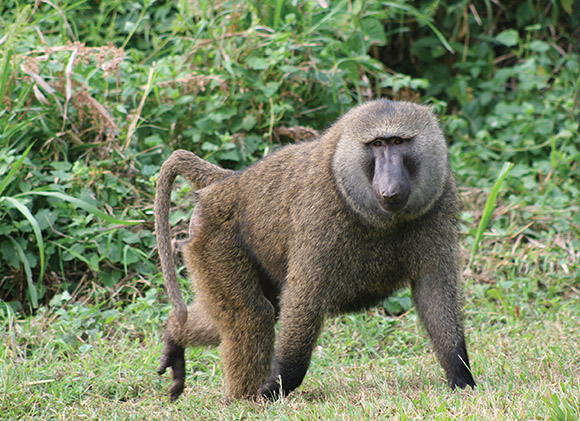 |
 |
| current issue |  |
past issues |  |
send a letter/news |  |
address update |  |
advertise |  |
about us |  |
alumni home |
In the Balance
Page 4 of 5
Previous | Next
Researchers who can return to their comfortable homes will never entirely know what it's like to live in a remote African village, no matter how often they visit. But plenty of things do happen to give them some hints. Like the farmers, Hartter and his team have to fight off baboons, who routinely run amok in their research camp, splintering cabinets and shearing padlocks off pantry doors. Swinging a broom and shouting sends them screeching off--but just when the humans relax, the baboons resume their plunder. "Their teeth are as big and as sharp as a lion's, and you absolutely get the feeling that they are mocking you," he says. Disease, too, poses a threat to both researchers and residents, though researchers have access to the latest drugs. Just before he was to return from Uganda in 2011, Hartter led a 20-mile round-trip hike to collect thermometers and rain gauges from deep in the forest. By the time he returned to camp, he was shivering in 90-degree heat and seeing spots, and his foot had swelled inside its shoe. At a hospital in Kampala he was diagnosed with typhus. That wasn't accurate, as it turned out, but luckily the treatment, a heavy dose of the antibiotic doxycycline, helped him anyway. It wasn't until he had flown back to the United States and consulted with numerous doctors that he was diagnosed with African spotted fever. Had he not received the antibiotic in Kampala, he would have died. The way Hartter sees it, that proves he was lucky to be in Uganda, where the health care system is accustomed to tropical diseases. Spotted fever has had no impact on Hartter's enthusiasm for Africa. Home with his family in New Hampshire, he carefully keeps up with the latest information on diseases and armed conflicts in the regions where he'll travel, and says he takes only calculated risks. He goes to Uganda because he loves it, and because there's so much to do. He'd like to expand his research into remote areas of Tanzania soon, and he dreams of creating an international conservation curriculum at UNH. Already he collaborates with scholars from many disciplines and universities. Within UNH, Meghan Howey, assistant professor of anthropology, is working on a project that focuses on pre- historic human interaction with the environment. Michael Palace, a faculty fellow with the UNH Sustainability Institute's Biodiversity Education Initiative, collaborated with Hartter to create long-term models for Ugandan firewood use. Lisa Tiemann, a postdoctoral researcher in the department of natural resources and the environment, works with Hartter on a soil sustainability study. |
blog comments powered by Disqus


